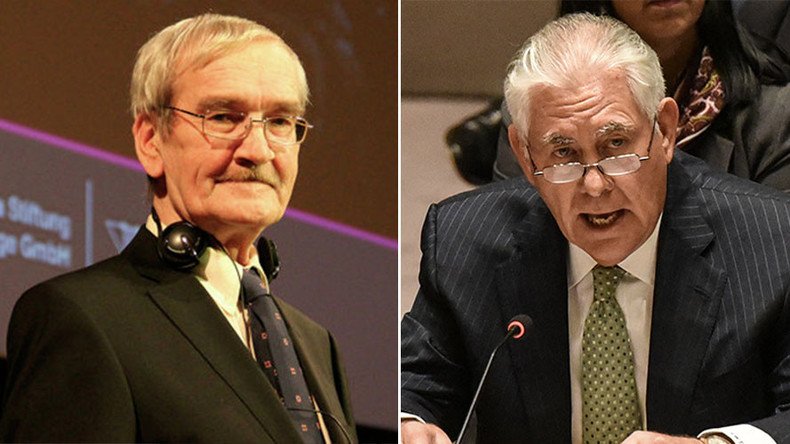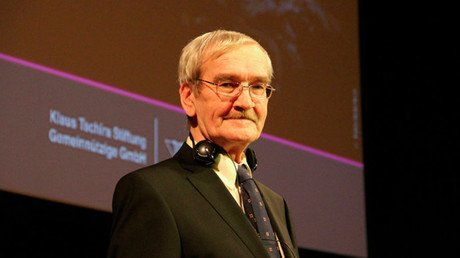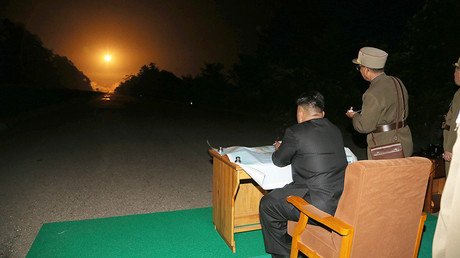‘Man who saved the world’: Tillerson praises Soviet officer who averted nuclear war

Rex Tillerson took a moment at the UN Security Council to remember Soviet officer Stanislav Petrov, who bravely called a false alarm when all computer data told him the US had launched nuclear missiles at the USSR at the height of the Cold War.
“Just this week, the world learned of the passing of a little known, but important figure in the history of the Cold War. His name was Stanislav Petrov and he is sometimes referred to as the man who saved the world,” the US Secretary of State said Thursday at a Security Council meeting on nuclear non-proliferation.
Tillerson then went on to tell the story of the Soviet officer, who one night in 1983 was on duty, in charge of a nuclear early warning center near Moscow, when his computers detected incoming American nuclear missiles.
Despite all systems telling him that the bombs were heading toward the Soviet Union, Stanislav Petrov recognized it was a false alarm and reported the technical malfunction to his superiors, thus preventing a retaliatory attack by the Soviet Union which would most likely have triggered a nuclear Armageddon.
“This episode illustrates just how high the risk factor is with nuclear weapons,” Tillerson said.
Petrov described that fateful night of September 26, 1983, in an interview with RT seven years ago.
“My cozy armchair felt like a red-hot frying pan and my legs went limp. I felt like I couldn’t even stand up. That’s how nervous I was when I was taking this decision,” he said.
“Giant blood-red letters appeared on our main screen, saying START. It said that four more missiles had been launched.”
Taught that in case of a real attack the US would have gone on an all-out offensive, Petrov told his bosses the alarm was caused by a system malfunction.
“I’ll admit it, I was scared. I knew my decision would have a lot of consequences,” he said.
Petrov had only 10 minutes to determine whether the threat was real, before the Kremlin could launch an attack in response.
In 2006, Petrov received an award from the UN Association of World Citizens, which read: “To the man who averted nuclear war.”
“At first when people started telling me that these TV reports had started calling me a hero, I was surprised. I never thought of myself as one – after all, I was literally just doing my job,” Petrov said.
The veteran kept a low profile, however, and died in his home near Moscow, at the age of 77 in May. The public only learned about his passing earlier this month.
Tillerson’s remarks on Petrov at the Security Council came as the council is trying to curb North Korea’s nuclear weapons program, while the US and the North exchange threats of mutual destruction.
This week, Pyongyang threatened to launch a nuclear strike against the US, if it attacks the North, after US President Donald Trump threatened to “totally destroy” North Korea, if it attacks the US or its allies.
The Trump administration is demanding North Korea’s complete denuclearization, and is pressing China, the North’s biggest trade partner, to rein in its neighbor.
“If China truly desires to denuclearize the Korean peninsula to promote stability and to avoid conflict in that sensitive region right on its own border, now’s the time to work with the rest of us ... to put the kind of pressure on North Korea that can change its strategic calculations before it’s too late,” Tillerson told the UNSC, of which China is a permanent member.
Meanwhile, Russia, another permanent member, has urged all parties to stick to a diplomatic approach to the Korean Peninsula crisis, with Russian Foreign Minister Sergey on Friday condemning both Pyongyang’s reckless tests and Washington’s belligerent rhetoric.
‘We need to cool hotheads down’: Lavrov urges diplomatic solution to N. Korea crisis. WATCH LIVE: https://t.co/2KIaiod714pic.twitter.com/N1GNgB2f7X
— RT (@RT_com) September 22, 2017
“We have to calm down the hotheads and understand that we need pauses, we need contacts,” Lavrov said in New York.
The UNSC imposed two rounds of sanctions in the past several months, following the North’s repeated testing of ballistic missiles.














